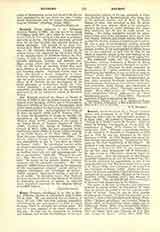

Baunard, LOUIS, educator, b. at Bellegarde (Loiret), France, in 1828. He was one of the clergy of Orleans, until 1877, after which he was attached to the Catholic University of Lille, first as professor, and later as rector. No Catholic university profited more by the Law of 1875 that granted freedom of higher education. The transfer of the State University from Douai to Lille did not retard the progress of the Catholic institution. Guided by its zealous rector, and supported by the active charity of the manufacturers of Northern France, the University of Lille has graduated a great number of Catholic physicians, lawyers, and business men. Many young priests also have been prepared at Lille for the career of teaching, which they have since followed as professors in the petits seminaires and boarding schools. Technical courses exist for those who intend to devote themselves to manufacturing industries; a department of economics and the social sciences was established through the efforts of M. Duthoit for the development of the social principles of Catholicism; finally the “university extension”, a sort of popular circulating university, provides for lectures by the university professors in all the industrial centers of Northern France.
Msgr. Baunard received the degree of Doctor of Letters, in 1860; in the two theses which he wrote he treated of the pedagogy of Plato and of Theodulphus, Bishop of Orleans in the time of Charlemagne; both works which marked the beginning of a literary activity surpassed by few. As hagiographer he wrote on St. John the Apostle (1869) and St. Ambrose (1871). Ile wrote the biographies of Louise de Marillac, the foundress of the Daughters of Charity (1898); of Madame Barat (1876), foundress of the Ladies of the Sacred Heart; of Vicomte Armand de Melun (1880), Cardinal Pie, Bishop of Poitiers (1886), General de Sonis (1890, his most successful work), Cardinal Lavigerie (1896), M. Ernest Lelievre, founder of the Little Sisters of the Poor (1905), and M. Vrau, the great Christian manufacturer (1906). The French religious history of the nineteenth century was summarized by him in “Un siecle de l’Eglise de France” (1901). He contributed notable works of religious psychology in his celebrated books, “Le doute et ses victimes” (1865), in which the pages on Jouffroy were both new and surprising, and “La foi et ses victoires” (1881-83). Whatever his subject, Msgr. Baunard was always an “awakener of souls” by reason of his delicate literary conscientiousness and his admirable fecundity. His “Esperance” (1892) throws much light on the beginnings of the contemporary religious revival among intelligent Frenchmen; his “L’evangile du pauvre” (1905) appeared opportunely during a period of social unrest. As university rector, Msgr. Baunard occupies a foremost place in the history of the Catholic university movement; as author, he collected much important material for the religious history of modern France.
GEORGES GOYAU

